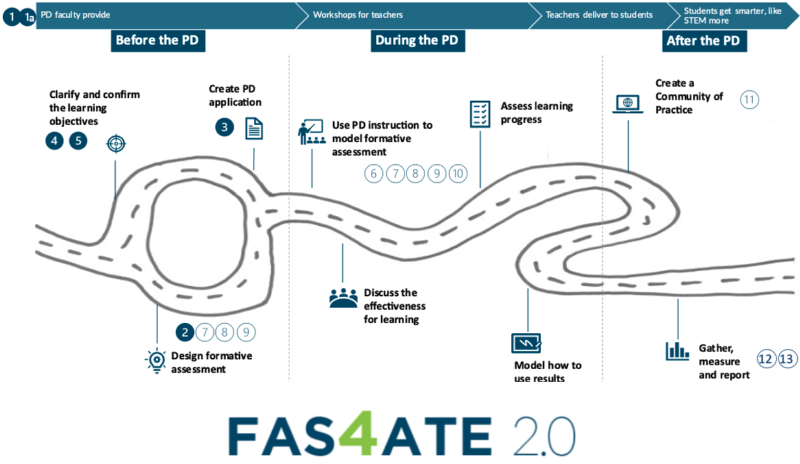Gathering information about the impact of teacher professional development on student learning is challenging!
While professional development opportunities flourish, an ongoing challenge is providing evidence that these activities make a difference in fostering the growth of the knowledge, skills, and productive attitudes of students who are pursuing technician careers in STEM fields.
The Formative Assessment for Advanced Technician Education 2 (FAS4ATE2) project draws together earlier research and international expertise at the Centre for Program Evaluation at the University of Melbourne (AUS) to address two concerns: how best to design formative assessment for ATE PD and to discover what design factors allow for more effective reporting of student-level outcomes.
Consultation - Weld-Ed
We are currently collaborating with Weld-Ed (DUE 1400351) on designing assessment approaches for their upcoming professional development program.
Here is our HI-TEC Virtual 2021 presentation. An overview of Formative Assessment Backward Design, and an interview with Rick Polanin and Michael Fox of Weld-Ed.
We would love to learn from you. Just drop us a line.
Efficacy Research - Does It All Work?
At the heart of our research is the following question:
What factors contribute to the successful implementation of formative assessment to report professional development outcomes?
We have responded by developing a case study approach to explore what makes for successful implementation of formative assessment and reporting of student outcomes.
Success Case Study: Formative Assessment in Cross-Institutional Mentorship Program
Nearing completion, our success case study of the CCSF-UCSF: A Collaborative Approach to Work-Based Learning project (DUE 1801186, 1800998) allows us to identify and reflect on the factors impacting the success and effectiveness of implementing formative assessment leading to a deeper understanding of factors critical to meeting ATE’s evaluation expectation - using classroom practices to measure changes in students’ learning outcomes and dispositions (NSF18-571) - and generate insights into the barriers that may prohibit PI’s use of formative assessment to capture changes in participants’ learning and program impact.
PD & DEI in Professional Development: An ATE PI Census
We are currently analyzing responses to two special topics question sets that were included in the ATE PI Census Survey for 2022: “Assessment of Professional Development Activities for Educators” and “Diversity, Equity, and Inclusion in Professional Development Activities for Educators.” The purpose of these question sets is to identify, explore, and understand how ATE projects and centers incorporate high-impact educational practices and attention to issues of diversity, equity, and inclusion into their professional development activities. Preliminary results will be shared at HI-TEC in July 2022.
Contact Robin Datta (PI) or Amy Gullickson (Co-PI) if you are interested in learning more about our project or working with us on designing an assessment approach for your project.
PI: Robin Datta, Ph.D.
Faculty, Political Science
Edmonds College
T: +1-425-640-1590
E: [email protected]
Co-PI: Amy Gullickson, Ph.D.
Senior Lecturer
Centre for Program Evaluation, Melbourne Graduate School of Education
The University of Melbourne
T: +61 3 9035 9682
E: [email protected]
Evaluator
Terryll A. Bailey, President
The Allison Group
T: +1-206-525-7175
E: [email protected]
Research Assistant
Mia Chen
Centre for Program Evaluation, Melbourne Graduate School of Education
The University of Melbourne
E: [email protected]
The National Science Foundation's Advanced Technological Education (ATE) program has been funding innovation at two-year colleges for over twenty years. With a focus on the education of technicians for the high-technology fields that drive our nation's economy, and strong partnerships between academic institutions and industry, ATE promotes improvement in the education of science and engineering technicians at the undergraduate and secondary school levels.
To learn more about ATE, please visit the NSF ATE program home page.

DEVELOPMENT • CONSULTATION • EFFICACY RESEARCH
Development - Beginning With The End In Mind: Outcomes + Tools + Logic Model.
Our first activity is developing a set of tools that help PI's and Evaluators use a backward design process to reconfigure both their PD activities and the assessments they will use. We emphasize using Formative Assessment techniques coupled with the SOLO taxonomy to assist you in making high-quality, well-documented, and evidence-based claims about your PD’s impact on student learning.
Ongoing usability testing of these tools and techniques is being undertaken by students in a Master of Evaluation course at the University of Melbourne.
Here are the tools we have developed to date:
May 18 2022 - Webinar - “Leveraging Assessment & Evaluation for Student Success: Working Smarter Not Harder.” EvaluATE. May 18, 2022.
Abstract: Often professional development projects skip assessments because participants don’t want to take tests. However, assessment done well is integral to participant learning and creates a culture of information exchange leading to more effective professional development and measurable impacts. In this session, you will learn how to integrate assessment into your professional development to boost learning for your participants and their classroom students, while simultaneously generating evaluation data. Everyone engaged in designing, delivering, and evaluating professional development will leave this session with ideas and access to tools that will help you leverage learning and deliver the data you need for reporting.
July 25-28, 2022 - Poster - "Formative Assessment: Diversity, Equity, and Inclusion in ATE Professional Development, 2021." HI-TEC 2022 Conference, July 25-28, 2022. Salt Lake City.
Abstract: The 2022 ATE PI Census Survey includes two question sets developed by the Formative Assessment Systems for ATE 2 project: “Assessment of Professional Development Activities for Educators” and “Diversity, Equity, and Inclusion in Professional Development Activities for Educators.” The purpose of these question sets is to identify, explore, and understand how ATE projects and centers incorporate high-impact educational practices and attention to issues of diversity, equity, and inclusion into their professional development activities. This poster presents a “first look” analysis of the survey responses that PIs and evaluators may use to better shape their formative assessment and evaluation practices.